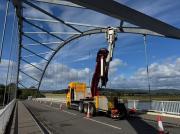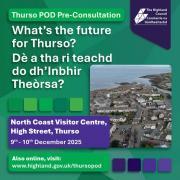Reducing The Attainment Gap For Young People In Highland
4th December 2019
Improving literacy and numeracy is giving more young people a better chance of fulfilling their potential in life.
Highland Council is committed to tackling poverty and inequality and enabling all our children and young people to reach their full potential, with a focus on reducing the attainment gap for those from more disadvantaged communities across the Highlands.
A report to committee on Thursday 5th December, will set out significant progress that schools in the region are making in closing the poverty-related attainment gap, by improving equity for students living in deprivation.
The improved measures and progress being made in pupil education are being supported through Pupil Equity Funding (PEF) and Scottish Attainment Challenge (SAC). Working within the National Improvement Framework, alongside the Council's vision of ambitious, sustainable and connected communities, schools have identified local barriers to equity and developed plans and initiatives to improve literacy, Numeracy, Health and Wellbeing as well as positive destinations for young people.
Initial figures highlight the increase in both numeracy and literacy levels, as well as a significant reduction in the number of exclusions. The percentage level increase over 4 years has seen a significant improvement at all levels of literacy and numeracy. These improvements have translated into reductions in the attainment gap at almost all levels, and particularly at level 4 literacy and numeracy.
Attainment in literacy and numeracy for young people from our most deprived communities has seen increasing percentages of leavers attaining in National Level 3,4 and 5 awards in other literacy and numeracy and a rising trend for them to access employment, further education and higher education. The Council is now 3.65% above the national percentage for young people from deprived areas reaching a positive destination after school.
Exclusions for our young people from our most deprived backgrounds have reduced by 36% at a time when significant numbers of our most vulnerable young people have been returning to be cared and educated within the Highlands. This is a very good outcome and credit must be given to all our staff who are contributing to achieving much more inclusive approaches across our services and communities.
Members will be asked to note this good news and examples of best practice. They will also be asked to endorse and contribute to an annual reporting mechanism on young peoples' attainment from deprived backgrounds at local area Council committees.
Interim Head of Education Nicky Grant commented on the report. She said: "In tackling the twin targets of excellence and equity, we need to be ambitious in aiming for the best possible outcomes for all our young people. We need these outcomes to be sustainable, and we will do that by developing the skills and attributes of all children and young people regardless of their backgrounds. Our work needs to be connected, so that we can learn from each other, drawing on best practice and discover what is working well that might be adapted for use in each local setting. This improvement reflects the important work of all out staff and those involved in supporting young people in deprived communities."
Scottish Government release 3 December 2019
Reading levels among Scotland's children have risen sharply in the last three years and the attainment gap is closing, according to an international survey.
Data from the Programme for International Student Assessment 2018 (PISA) shows that reading levels are now above the average, with just five Organisation for Economic Co-operation and Development (OECD) countries, out of 36, higher than Scotland.
PISA data also shows that social background is now less of factor in performance, corroborating wider evidence that the attainment gap is closing.
Performance in maths and science was similar to Scotland's performance in 2015 at the OECD average.
Other findings show that compared to the OECD average:
a higher proportion of Scotland's pupils felt inspired by their teachers' enthusiasm
pupils were more likely to feel that their teachers enjoyed teaching and liked teaching their class
teachers are more likely to give feedback to students to improve their performance, while students were more likely to say this happened in every or many lessons
Deputy First Minister John Swinney said:
"These are very encouraging results and the latest sign that our education reforms are working. Scottish schools are improving and this international study confirms that.
"Reading underpins all learning, and the sharp rise in performance is good news.
"The improvement has been driven by great teachers and well-supported pupils, but also our unrelenting focus on improving literacy through the Scottish Attainment Challenge and Pupil Equity Fund. Those efforts are now paying dividends, with only five countries scoring higher than Scotland at reading.
"The figures on social background also confirm that we are closing the gap between pupils from the richest and poorest backgrounds.
“Maths and science scores are stable at the OECD average, so we need to see the kind of improvement that we now see in literacy in these areas too. That is the challenge.
“An inspection of maths and numeracy published by Education Scotland shows what is working and how we can improve. It will help as we move on the next phase of driving up standards in Scotland’s schools.
“And, in science, good progress has been made with delivery of our five-year STEM strategy, with the roll-out of career-long professional learning grants and new online resources for teachers. The impact of it will only just be beginning to be felt on the ground and we will continue to push for the improvements that we know can be made.
“There is plenty of work still to do to improve Scottish education but today’s report should give people a strong sense that we are on the right track, making substantial progress and seeing results where it counts - in the classroom."
Notes
PISA is designed to assess pupils' skills in reading, mathematics and science. The data from this assessment was conducted in Scotland in 2018 across 107 schools and 2,969 pupils. ... The average is taken from the assessments of the members of the Organisation for Economic Co-operation and Development (OECD).
The Scottish Government release may be more up beat than up front. The BBC web site states -
How did Scotland rate this time?
Scotland's scores in the 2018 Pisa assessments were "above the OECD average" in reading and "similar to the OECD average" in maths and science.
Scotland's score in reading rose from 493 in the last data to 504 this time.
Compared to the other home nations, it was ahead of Wales and Northern Ireland but slightly behind England.
Performance in maths slipped by two points (491 down to 489) against 2016 - the figure was behind both England and Northern Ireland.
In science, performance slipped seven points (497 to 490) - the total was notably behind England and slightly behind Northern Ireland.
https://www.bbc.co.uk/news/uk-scotland-50642855
Related Businesses
Related Articles
Exciting Career Opportunities With The Highland Council Now Open For Applications
# 10 December 2025 Career opportunities with The Highland Council The Highland Council is looking to fill a variety of posts relating to civil engineering and flood risk management based in locations across the area. Included are opportunities specifically for civil engineering graduates and technicians, providing the ideal job with career progression for anyone recently qualified and ready for a varied and interesting role.
What the NC500 Research Projects Are Designed to Do - and Why They Matter for the Highlands
As the North Coast 500 approaches its tenth anniversary, it has become one of Scotland's most well-known tourism success stories. The 516-mile loop around the far north of the Highlands has been celebrated internationally, marketed as a world-class road trip, and credited with transforming visitor numbers in some of Scotland’s most remote areas.Help Shape the Future of Thurso
The Highland Council is inviting people that live, work, or study in Thurso, to come along to the public consultation events to have their say. This is an opportunity to help shape the future of Thurso, to gather views and ideas.
Are Scottish Councils Quietly Reversing Outsourcing? A Look at Insourcing, Cuts and the Highland IT Shift
A notable article in the Guardian on 6 December 2025 noted the high sums being paid by London councils outsourcing services to private firms. The article starts with the reduction in council funding by UK government since 2010.Council welcomes Visitor Levy flexibility plan
The Highland Council welcomes moves by the Scottish Government to introduce greater flexibility on how it could design a Visitor Levy Scheme for consultation. The Visitor Levy (Scotland) Act 2024 currently provides local authorities with discretionary powers to implement percentage-based levies following statutory consultation.Highland Council is reaching out for views to shape its next 26/27 budget.
As it looks to set out its forthcoming priorities, the council is seeking involvement from members of the public, including businesses, community groups, parents, and young people. All their opinions are going to be crucial in deciding how Highland Council will take on its budget challenge for 2026-2027.Have your say in Thurso's future £100million investment by attending public consultation events
Thurso is to benefit from £100m investment in education and community facilities and are rolling out the first phase of public consultations on 9 and 10 December 2025. The Highland Council is inviting people that live, work, or study in Thurso, to come along to the public consultation events to have their say; this is an opportunity to help shape the future of Thurso, to gather views and ideas.Finding new owners for empty homes - Scheme launched to help return more empty homes to active use
A new online portal has been launched to bring empty homeowners together with prospective buyers or developers with the aim of facilitating more properties to be used as homes again. Covering the whole of Scotland, this builds on the success of local pilots, referred to as "matchmaker schemes".Consideration for short term let control area in Skye and Raasay
Steps towards introducing a short term let control area have been considered by Highland Council's Isle of Skye and Raasay area committee. On Monday (1 December 2025) the committee heard evidence to justify the grounds for the introduction of a Short Term Let Control Area covering all or part of Skye and Raasay.Workforce North event spotlights Highland economy
EMPLOYERS and educators from across the Highlands have gathered to hear how a new initiative is aiming to transform the region's economy. Workforce North - A Call to Action brought together business leaders and teachers from primary and secondary schools from across the Highland Council area with a wide range of partners geared towards education, learning and skills development at Strathpeffer Pavillion.
